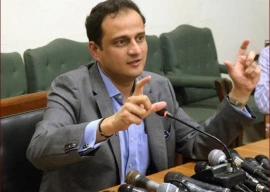
“Most people in the area believed Nazrah and Islamiat was enough for their children,” he says. “I shut down the morning shift because I believe students should be educated so that they can excel in life.”
And while the foundation that funds the madrassa stopped its support, Qari Raza feels he has done the right thing. He’s noticed that the children are more polite now and want to dress up properly.
The school has been adopted by the Pakistan Poverty Alleviation Fund (PPAF) and Indus Resource Centre (IRC) who fixed up its skeletal frame and opened it six months ago. According to PPAF education project manager Bilal Hasan, they received an overwhelming response. The sheer number of Montessori enrollments indicates that parents are making the right choice.
“The school was not functional ever since it was set up in 1992,” he says. “There was only one room and the teacher who was posted here would be absent most of the time.” According to its records, only 40 children had enrolled and none of them had progressed beyond the fifth grade.
Amir, along with 173 other poor children, can now march to school every day in Rehri Goth, a small fishing village, where boys are expected to set out to sea with their fathers at a young age.
Principal Abida Mehmood says the residents were so encouraging that she started a remedial class for girls who have missed out on their primary education. Thirty-six girls are enrolled in the six-month programme today. “Getting the older boys to come is difficult,” she says, though. “Most of them start going out to sea during the fishing season and lose interest in their studies at an early age.” It is either school or earning up to Rs1,000 a day catching crabs.
Tasneem, who has three children studying at Dawood Usman, says she is happy with the opportunity. Her husband has also been telling their daughter to keep it up and they even hope she can pursue higher studies as well.
The school has not just tackled education, teachers have been tackling the children’s gutka addiction.
Even the Montessori students found it difficult to quit. But one summer camp, the school roped in students and parents to warn them about its dangers and now they keep a check on all students.
The project has gone so well that the IRC has acquired another ghost school right across Dawood Usman and is planning to open a secondary campus by April. Remedial classes for boys will be housed in the building for seniors then. Space is an issue for now as Dawood Usman’s second, third and fifth classes all sit together in one room. Irfan Ali who teaches all three, says a lack of space has forced the administration to cram the students together in one room. He divides the blackboard into three parts and teaches each grade individually. There is currently no fourth grade, however. None of the students qualified for it when they took the admissions test.
For now the syllabus consists of English, Sindhi, Urdu, General Knowledge and Math but the teachers and administration hope to open a college section soon.
And if the drop-out rate stays low, its is likely the students of today will be taking college Mathematics tomorrow.
Published in The Express Tribune, February 2nd, 2011.


1725443747-0/Untitled-design-(5)1725443747-0-165x106.webp)














COMMENTS (5)
Comments are moderated and generally will be posted if they are on-topic and not abusive.
For more information, please see our Comments FAQ